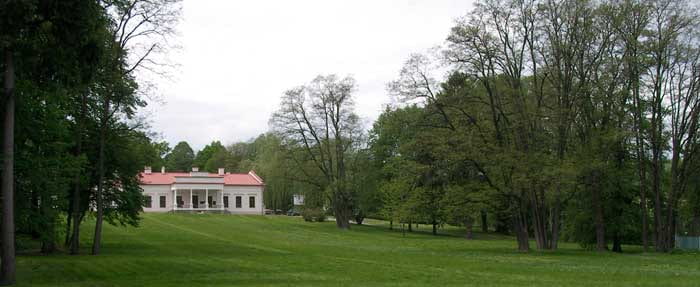Polish Music Center Newsletter Vol. 14, no. 6
PMC News
A Review of PMHS Vol. 10
by Jeremy Nicholas
 ZYGMUNT STOJOWSKI: Life and Music
ZYGMUNT STOJOWSKI: Life and Music
Joseph A. Herter
Polish Music History Series, Vol. 10
Figueroa Press 2007
ISBN: 1-932800-26-3
329 pages, illustrated, paperback
Price: $25
[The following article first appeared in Polish under the title Odnalezc Stojowskiego, in the March 2, 2008 issue of Ruch Muzyczny, vol. 52 no. 5, pp. 36-37.]
The composer, pianist and teacher Zygmunt Stojowski (who I have always known as Sigismond and now learn was christened exotically Zygmunt Dyonizy Antoni Jordan de Stojowski) was born in 1870 in Strzelce near the city of Kielce. His early teachers were his mother and, thanks to the patronage of the erstwhile Chopin pupil Princess Marcelina Czartoryska, Władysław Zeleński in Cracow. Thence to Paris at eighteen to study piano with Louis Diémer and composition with Léo Delibes. He gave his first concert in 1891 with the Colonne Orchestra playing his own Orchestral Ballade and First Piano Concerto conducted by Benjamin Godard. César Franck offered to teach him the organ; Tchaikovsky befriended the young man and was scheduled to conduct his Suite for Orchestra; Nikisch and von Bülow conducted his works; Saint-Saëns, Anton Rubinstein and Brahms were acquaintances; he became the devoted disciple and friend of Paderewski. It was an auspicious start to a career.
In 1905, Stojowski’s reputation as a pianist and teacher was such that he was invited to New York to become the first head of the piano department at the newly-formed Institute of Musical Art (later to be the Juilliard School of Music). Dividing his time between composing, performance and teaching, Stojowski’s stock was high: his Symphonic Rhapsody Op.23 and Piano Concerto were given at the Metropolitan Opera House, he gave a noteworthy series of historical recitals in 1912 and in 1916 the New York Philharmonic devoted an entire concert to his works. His piano works were played by Friedman, Ganz, Grainger, Hofmann, Samaroff, Schelling and Paderewski. His chamber works had champions in the likes of Kochański, Enesco and Casals.
So why did Stojowski disappear from view? At the age of 48 he married one of his pupils, the Peruvian pianist Luisa Morales Macedo (1890-1982). Is it a coincidence that after his marriage, he composed almost nothing more of any substance? He had three children – ‘my most successful compositions’, he called them – and put most of his energies into teaching. As a composer, he wrote inspired, well-crafted, defiantly romantic music and, being unable or unwilling to move with the times, was a fish out of water in the new world of Stravinsky, Schoenberg et al. Even Ravel was, in his eyes, ‘overestimated’. His concerto appearances were irregular and featured mainly his own works (he had a puzzlingly small repertoire by others); he gave recitals, but few pianists with a beard and pince-nez, no matter how gifted, have ever captured the public imagination; he made no commercially released recordings. Despite the enormous respect he earned from his peers, he kept a very low profile for the remaining twenty five years of his career. Fewer musicians played his music. There was no recorded legacy. Zygmunt Stojowski quickly slipped into obscurity after his death in 1946.
In the more than sixty years since then, little of his music has been heard. His own country has been conspicuously backward in promoting his music – the Warsaw Philharmonic, for example, completely ignored him during its centennial season. Then in 2002 came the release of Jonathan Plowright’s superlative recording of the two piano concertos on Hyperion. Critics were bowled over, not merely by Plowright’s playing but by the quality of the music with its soaring romanticism, virtuosic writing, accomplished and imaginative orchestration and heart-touching melodies. How had two such glorious works sunk so far below the horizon? What were Stojowski’s other large-scale works like – the Suite Op.9, the Symphony in D minor, the Rapsodie symphonique for piano and orchestra, and many others?
 Things are changing now due in no small measure to the efforts of the author of this volume. Joseph A. Herter, a Detroit-born music director and teacher who has lived in Poland since 1974, has almost single-handedly mounted a revival of interest in Stojowski’s music. His book is divided roughly in two: the first 145 or so pages are devoted to the narrative of Stojowski’s life, marshalled from an impressive array of sources. It cannot be described as a life that would attract the attention of a film producer. Herter can reveal little beyond the bare facts and is unable to bring his character to life. He emerges from these pages as a somewhat dry, prosaic little man who – let us be kind – did not take a good photograph. Somewhat frustratingly, the author reveals that amongst the Stojowski memorabilia to which he had access were ‘scores of small notebook pads in which the Polish musician recorded his philosophical thoughts on music and life’, but these are not quoted.
Things are changing now due in no small measure to the efforts of the author of this volume. Joseph A. Herter, a Detroit-born music director and teacher who has lived in Poland since 1974, has almost single-handedly mounted a revival of interest in Stojowski’s music. His book is divided roughly in two: the first 145 or so pages are devoted to the narrative of Stojowski’s life, marshalled from an impressive array of sources. It cannot be described as a life that would attract the attention of a film producer. Herter can reveal little beyond the bare facts and is unable to bring his character to life. He emerges from these pages as a somewhat dry, prosaic little man who – let us be kind – did not take a good photograph. Somewhat frustratingly, the author reveals that amongst the Stojowski memorabilia to which he had access were ‘scores of small notebook pads in which the Polish musician recorded his philosophical thoughts on music and life’, but these are not quoted.
There is much detail about Stojowski’s fund-raising activities for his fellow-countrymen during both World Wars, and a chapter devoted to brief career sketches to some of his pupils, the most prominent of whom were Mischa Levitzki, Shura Cherkassky (briefly), Oscar Levant (extraordinarily), the future film composer Alfred Newman, Arthur Loesser and Guiomar Novaes. Not a bad haul. There is a generous amount of musical illustrations, programmes and photos, though it would have made more sense to have arranged the various portraits of Stojowski in chronological order.
If ‘the life’ fulfils its purpose admirably, the following 105 pages are exemplary, for Herter has assembled a complete catalogue of Stojowski’s works. Each entry is accompanied by the dedication (and information on the dedicatee), the movements and / or tempo markings, the location of manuscripts, details of different editions, additional remarks (an analysis of the work, a list of historical performances and excerpts from reviews) and recordings. This is work of immense value, comprehensive and laid out with commendable clarity. In addition, two appendices list Stojowski’s complete orchestral performances from 1885-1938, and all his manuscripts held by the Zygmunt and Luisa Stojowski Collection at the Polish Music Center, University of Southern California (Los Angeles).
Thanks to Mr Herter, we now know what Stojowski wrote and where to find it. There really can be no excuse for his music to be ignored any longer. This was the author’s aim in writing his book and in this he has succeeded wholeheartedly, for it must surely stimulate pianists, cellists, trombonists (yes, there is an 1889 Fantaisie for tenor trombone!), singers and conductors to investigate further. Stojowski deserves no less.
Jeremy Nicholas is a regular contributor to Classic FM Magazine, Gramophone, BBC Music Magazine and International Piano. He has written several books about music, including CHOPIN – His Life And Music, GODOWSKY – The Pianists’ Pianist, and A Beginner’s Guide to Opera. He lives in rural Essex with his wife Jill and daughter Rosie. For a full biography, please visit www.jeremynicholas.com.
Visit To Poland
During a recent trip to Europe, Polish Music Center manager Krysta Close spent 5 days in Southern Poland, visiting family as well as strengthening the ties between the musical life of Poland and that of California. The purpose of this trip was to maintain connections with Polish scholars and set the stage for the upcoming visit by members of the Board of Directors of the Paderewski Festival in Paso Robles. The delegation will travel to Poland in late June 2008 at the Polish Government’s invitation, which was recently extended to the Board by Paulina Kapuścińska, Consul General of the Republic of Poland in Los Angeles.
First, Krysta and her husband Kenneth met with Paderewski scholar, Dr. Małgorzata Perkowska, of the Jagiellonian University’s Musicology Institute. Together they visited Kąśna Dolna, the only remaining of the estates once owned by Paderewski world-wide (pictured above). After a tour of the grounds and the surrounding area of Ciężkowice, they were greeted warmly by Kąśna Dolna’s Director, Mrs. Krystyna Szymańska, who expressed her desire to welcome the delegation from Paso Robles in June and to continue collaborations between Kąśna Dolna and the PMC and Paderewski Festival. Krysta Close also met with world-renown cellist and interpreter of Stojowski repertoire, Tomasz Strahl, and his partner in the Chopin Duo, pianist Krzysztof Jabłoński, as well as the influential music critic for Ruch Muzyczny, Józef Kański, who were all presenting in the evening’s lecture and concert.
Back in Kraków, the travelers visited Dr. Perkowska at her office in the Jagiellonian University, where they viewed the Musicology Institute’s extensive Paderewski collection, much of which was bequeathed by Paderewski to the University in his will. Dr. Perkowska also graced them with a tour of some of the historic buildings of Jagiellonian, the oldest University in Europe. The building in which the Musicology Institute is now house was once owned by a wealthy Krakowian family and still bear the markings of luxury.
 Krysta and her husband also visited with pre-eminent Szymanowski scholar, Dr. Teresa Chylińska. Dr. Chylińska gave them extensive information about the recent premiere of the new version of Karol Szymanowski’s largely unknown operetta, Loteria na mężów, czyli Narzeczony nr 69 [The Husband Lottery, or Fiance No. 69], on November 5, 2007 at the Kraków Opera. Because the text of the original operetta was lost during the war, this composition has been updated with a new libretto, in English and Polish translations, by Julian Krzewiński-Maszyński in collaboration with Wojciech Graniczewski, who developed the modern theater concept. This production is now available on DVD.
Krysta and her husband also visited with pre-eminent Szymanowski scholar, Dr. Teresa Chylińska. Dr. Chylińska gave them extensive information about the recent premiere of the new version of Karol Szymanowski’s largely unknown operetta, Loteria na mężów, czyli Narzeczony nr 69 [The Husband Lottery, or Fiance No. 69], on November 5, 2007 at the Kraków Opera. Because the text of the original operetta was lost during the war, this composition has been updated with a new libretto, in English and Polish translations, by Julian Krzewiński-Maszyński in collaboration with Wojciech Graniczewski, who developed the modern theater concept. This production is now available on DVD.
It was a successful trip all around, and the groundwork has been laid for a successful trip for the Paso Robles delegation as well. See below for more details on this next cultural mission.
Recent Donations
 Dr. Teresa Chylińska donated the Polish Music Information Center’s new 10-CD set, entitled “Polish Collection of the Warsaw Autumn, 1956-2005,” which was prepared for the 50th Anniversary of the “Warsaw Autumn” Contemporary Music Festival. This collection consists of editor Andrzej Chłopecki’s personal choice of 70 works by 70 Polish composers as recorded during the Festival concerts given between 1956-2005. These recordings and the notes that accompany will be of great value to the PMC and its research patrons.
Dr. Teresa Chylińska donated the Polish Music Information Center’s new 10-CD set, entitled “Polish Collection of the Warsaw Autumn, 1956-2005,” which was prepared for the 50th Anniversary of the “Warsaw Autumn” Contemporary Music Festival. This collection consists of editor Andrzej Chłopecki’s personal choice of 70 works by 70 Polish composers as recorded during the Festival concerts given between 1956-2005. These recordings and the notes that accompany will be of great value to the PMC and its research patrons.
(Kraków, May 08)
 Cellist Tomasz Strahl donated his recent recording of “Chopin Chamber Music” (BeArTon 039) to the PMC, in recognition of the mutual goals of promotion of Polish music, especially that of Zygmunt Stojowski. (Ciężkowice, May 08)
Cellist Tomasz Strahl donated his recent recording of “Chopin Chamber Music” (BeArTon 039) to the PMC, in recognition of the mutual goals of promotion of Polish music, especially that of Zygmunt Stojowski. (Ciężkowice, May 08)
 Paderewski scholar Dr. Małgorzata Perkowska donated a signed copy of her book Ignacy Jan Paderewski o sobie: Zarys biografii wzbogacony listami artysty[Ignacy Jan Paderewski Himself: A Biographical Outline Enriched with Artist’s Letters]. The book was signed in the manor house once owned by Paderewski, in Kąśna Dolna. (Ciężkowice, May 08)
Paderewski scholar Dr. Małgorzata Perkowska donated a signed copy of her book Ignacy Jan Paderewski o sobie: Zarys biografii wzbogacony listami artysty[Ignacy Jan Paderewski Himself: A Biographical Outline Enriched with Artist’s Letters]. The book was signed in the manor house once owned by Paderewski, in Kąśna Dolna. (Ciężkowice, May 08)
 This new recording of the music of Zygmunt Stojowski (DUX 0625) was recently donated to the PMC by Stojowski scholar Joseph A. Herter in Warsaw. See a review of this disc below. (Los Angeles, May 08)
This new recording of the music of Zygmunt Stojowski (DUX 0625) was recently donated to the PMC by Stojowski scholar Joseph A. Herter in Warsaw. See a review of this disc below. (Los Angeles, May 08)
Paderewski Board Heads To Poland
Members of the Board of Directors of the Paso Robles Paderewski Festival will make an official visit to Poland in June 2008 at the invitation of the Polish Government. The invitation was recently extended to the Board by Paulina Kapuścińska, Consul General of the Republic of Poland in Los Angeles. Consul Kapuścińska traveled to Paso Robles at the invitation of Marek Zebrowski, the Director of the Polish Music Center at the Thornton School of Music at USC, to attend the Paderewski Reprise Concert at Cass Vineyards & Cellars in November 2006. Since then, Consul Kapuścińska has been an annual visitor and supporter of the Paderewski Music Festival in Paso.
The Paso Robles Paderewski Festival Board Members expect to depart for Poland on June 23 and will return to Paso Robles on June 29. Their visit will begin in Kraków and include meetings with the Director of the Paderewski Institute at the Jagiellonian University and a visit to Paderewski’s estate in Kąśna Dolna about 100 miles southeast of Kraków, the former capital of Poland. The Board will continue on to Warsaw for meetings at the Presidential Palace, the Music Academy, University Archives, and also a side trip to Żelazowa Wola, birthplace of Frederic Chopin. Lastly, the Board will attend special ceremonies commemorating Ignacy Jan Paderewski, the great Polish pianist and world-famous statesman, in Bydgoszcz, the site of the Paderewski International Piano Competition which is held there every three years. The purpose of the Board’s visit in Poland is to establish closer cultural links between the City of Paso Robles and its musical and cultural partner organizations in Poland. The Polish government is hosting the trip, providing ground transportation, meals, lodging and interpreters for the delegates.
The Paso delegation traveling to Poland includes:
- Frank Mecham – Paso Robles City Mayor, Paderewski Festival Advisory Board Member
- Joel Peterson – Board President; Paderewski Festival Executive Board and grandson of one of the Festival founders, Virginia Peterson
- Steve Cass – Board Secretary; Paderewski Festival Executive Board
- Rachel Hamilton – Paderewski Festival Executive Board; Paderewski Youth Piano Competition Coordinator
- Paula O’Farrell – Paderewski Festival Executive Board; Festival Historian
- Marek Zebrowski – Artistic Director, Paderewski Festival Executive Board; Director of Polish Music Center at USC
- Mike Gibson – Paso Robles Chamber of Commerce; Paderewski Festival Advisory Board
Musical events honoring Paderewski resumed in Paso Robles in 2006 after a break of several years with a Paderewski Reprise recital by English pianist, Jonathan Plowright. The successful 2006 re-launching led to the expansion on musical offerings in 2007 with the creation of the Paso Robles Youth Piano Competition, also a function of the Festival. Organized in cooperation with the Cuesta College and Paso Robles Unified School District, the Competition spotlighted talented young pianists from San Luis Obispo County by presenting them in a free concert at the Paso Robles Inn Ballroom. The young pianists’ concert was followed by the 2007 Paderewski Festival Gala that featured internationally renowned performers in a specially selected program of works by Frederic Chopin, Zygmunt Stojowski, and Ignacy Jan Paderewski.
The main goal of the Festival Board is to continue bringing world class talent to Paso Robles and providing local residents with special musical events of the highest caliber. Such an approach will also stimulate the interest of national and international tourists and visitors to the Central Coast wine region. An important goal of the Paderewski Festival Board for their June 2008 visit in Poland is to initiate exchange programs allowing the winners of the Paderewski Youth Piano Competition in Paso to perform in Poland. The proposed exchange will provide a meaningful cultural outlet for the citizens of the Central Coast, continue to build the reputation of the Youth Competition and its participants, and raise musical standards throughout San Luis Obispo County.
Paderewski considered himself a resident of Paso Robles, where he spent a considerable amount of time between 1914 and 1939. Paderewski was an important agricultural pioneer in Paso Robles: his ranches covered over 3,000 acres and were planted with almonds and Zinfandel grapes. Without a doubt Paderewski was the most important historical figure associated with Paso Robles. Honoring the memory of this unique relationship, the citizenry of Paso Robles enthusiastically supported the Festival when it was initially launched in 1993. With the death of one of the main organizers and an earthquake, the Festival was temporarily suspended in 2003. In 2006 Marek Zebrowski approached Steve Cass about hosting a Paderewski Reprise concert at Cass Winery. The success of that event and the overwhelming enthusiasm of the community led to moving the Festival in 2007 to a much larger venue at the Paso Robles Inn Ballroom, where the concert of the Youth Competition winners and the Gala Concert were held.
 The historic Paso Robles Inn Ballroom will once again resonate with music during the 2008 Paderewski Paso Festival. An afternoon performance of Youth Competition winners will be followed by the evening Gala Concert at the Ballroom on November 15, 2008. A wine reception and an exhibit of Paderewski’s memorabilia are also planned to accompany this year’s event. This year’s musical performances are also planned to coincide with the “Elegant Evening” festivities scheduled to take place in Paso Robles during that same weekend.
The historic Paso Robles Inn Ballroom will once again resonate with music during the 2008 Paderewski Paso Festival. An afternoon performance of Youth Competition winners will be followed by the evening Gala Concert at the Ballroom on November 15, 2008. A wine reception and an exhibit of Paderewski’s memorabilia are also planned to accompany this year’s event. This year’s musical performances are also planned to coincide with the “Elegant Evening” festivities scheduled to take place in Paso Robles during that same weekend.
For more information on the 2008 Paderewski Paso Festival, please contact Jo Armstrong, Paderewski Paso Festival Coordinator, at Events by Jo Armstrong: (805) 237-9409.
News
Grubba Premiere
 A preview of Gedymin Grubba’s Sinfonia Jubilate for orchestra, choir and soloists will take place on June 14, 2008 in Gdańsk, in the Oliwa Cathedral. The main World Premiere concert is scheduled for June 19 in Warsaw’s Grand Theater-National Opera. The performers include Anita Rywalska-Sosnowska – soprano, Kamil Pękała – baritone, Noemi Grubba – piano, the Pomeranian Philharmonic Symphony Orchestra from Bydgoszcz, and “Astrolabium” Chamber Choir from Toruń. The composer will conduct his own work.
A preview of Gedymin Grubba’s Sinfonia Jubilate for orchestra, choir and soloists will take place on June 14, 2008 in Gdańsk, in the Oliwa Cathedral. The main World Premiere concert is scheduled for June 19 in Warsaw’s Grand Theater-National Opera. The performers include Anita Rywalska-Sosnowska – soprano, Kamil Pękała – baritone, Noemi Grubba – piano, the Pomeranian Philharmonic Symphony Orchestra from Bydgoszcz, and “Astrolabium” Chamber Choir from Toruń. The composer will conduct his own work.
Born in 1981, Gedymin Grubba studied organ and composition at the Gdańsk Music Academy. He performs approximately 60 concerts a year and serves as the chairman of Gabriel Fauré Cultural Promotion Foundation in Gdańsk. He is a member of the Youth Circle of the Polish Composer’s Union.
Panufnik Premiere
 On June 1, 2008 at 3:00 p.m., the U.S. premiere of Andrzej Panufnik’s Symphony No. 5, Symphony of the Spheres, will be performed by the American Symphony Orchestra in the Avery Fisher Hall of New York’s Lincoln Center. In this program, entitled “Spatial Explorations,” four twentieth-century masters explore the idea of spatial relations—both cosmic and finite—as represented by sound, in this aural journey through time and space. Also on the program are the following works: Toru Takemitsu – Cassiopeia, Rued Langgaard – Music of the Spheres (also a US Premiere), and György Ligeti – Apparitions and Atmosphères.
On June 1, 2008 at 3:00 p.m., the U.S. premiere of Andrzej Panufnik’s Symphony No. 5, Symphony of the Spheres, will be performed by the American Symphony Orchestra in the Avery Fisher Hall of New York’s Lincoln Center. In this program, entitled “Spatial Explorations,” four twentieth-century masters explore the idea of spatial relations—both cosmic and finite—as represented by sound, in this aural journey through time and space. Also on the program are the following works: Toru Takemitsu – Cassiopeia, Rued Langgaard – Music of the Spheres (also a US Premiere), and György Ligeti – Apparitions and Atmosphères.
Szymanowski Premiere
On June 15 at 8:30 p.m., the Jerusalem Symphony Orchestra and the Warsaw National Philharmonic Choir team up with Conductor Uri Segal at this year’s Israel Festival for a program entitled “Songs at Night.” This concert is a part of the Polish Year in Israel 2008-09 and is possible in conjunction with the Adam Mickiewicz Institute and with the assistance of the Polish Ministry of Culture and National Heritage, the Polish Foreign Ministry, and the Arkin Family Foundation. The Israel Festival is a member of the European Festivals Association.
 The program for the evening is as follows: Brahms – Song of Destiny, op. 54, Szymanowski – Song of the Night, op.27, Mahler – Das klagende Lied (also an Israeli premiere). Soloists are: Jadwiga Rappe, alto*; Mirela Gardinaru, soprano; and Ryszard Minkiewicz, tenor*.
The program for the evening is as follows: Brahms – Song of Destiny, op. 54, Szymanowski – Song of the Night, op.27, Mahler – Das klagende Lied (also an Israeli premiere). Soloists are: Jadwiga Rappe, alto*; Mirela Gardinaru, soprano; and Ryszard Minkiewicz, tenor*.
Mahler considered his Das Klagende Lied [Song of Lamentation], which he began writing at
the age of 18, as the moment when he established himself as a composer. Karol Szymanowski’s
Song of the Night [Piesn o nocy] was written to a text by the Persian Sufi mystic, Djalal al’Din Rumi, and is characterized by a fusion of Western and Eastern music styles. A lecture in Hebrew by Gil Shohat on the Song of the Night will take place in the Henry Crown foyer on June 15 at 19:30. Song of Destiny, which opens the program, is a lesser-known work of Brahms, which
deals with man’s impotence in the face of his destiny.
Ticket information, musical samples of this concert and further information about the Israel Festival can be found at the website:
http://www.israel-festival.org.il/2008/music_eng.html
Related Recordings
Mr. Minkiewicz recorded Szymanowski’s Symphony No. 3 with the Warsaw Philharmonic,
which is available for download on the website of Naxos Records (8.570721). He is also featured on “Szymanowski: Songs with Orchestra” (Naxos 8.223294 and 8.553688).
 Ms. Rappe (pictured at left) recorded Szymanowski’s Stabat Mater, Opus 53 and Demeter, Opus 37b with the Polish National Radio Philharmonic, Antoni Wit, conductor (EMI 27 0027); and Szymanowski’s opera, King Roger, Opus 46, with The City of Birmingham Symphony Orchestra under the direction of Simon Rattle (EMI CLASSICS 7243 5 56823 2 1).
Ms. Rappe (pictured at left) recorded Szymanowski’s Stabat Mater, Opus 53 and Demeter, Opus 37b with the Polish National Radio Philharmonic, Antoni Wit, conductor (EMI 27 0027); and Szymanowski’s opera, King Roger, Opus 46, with The City of Birmingham Symphony Orchestra under the direction of Simon Rattle (EMI CLASSICS 7243 5 56823 2 1).
Premieres In Kraków
The International Festival of Contemporary Music “Days of Kraków Composer’s Music” took place from May 9 – May 20, 2008, and was organized by the Kraków chapter of the Polish Composer’s Union (ZKP). The following World Premieres took place during the Festival: ULLMANN – VII Piano Sonata, KASZYCKI – Impresja for piano and violin, BACH-ZYCH – Ricercar a 3 z Musikalisches Opfer BWV 1079, PAWEŁEK – Ephreiafor wind quintet, string quartet, ŁUCIUK Medytacje (oratorio), GEMBALSKI – Muzyka domowa II, GEMBALSKI & GRODZKA-ŁOPUSZYŃSKA – Improwizacje for fisharmonia and soprano, RYCHLIK – “new work”, BIEŃ – Concertino for cello, chamber ensemble and electronics, ZYCH – Bagatele 1, 2, 3, DŁUGOSZ – DesAcordaR, WIDŁAK – Fanfara, JABŁOŃSKI – Labirynt umysłu, CHYRZYŃSKI – Dry pieces, WALACIŃSKI – Canti notturni, BARGIELSKI – Holzknechttanz, and ZAWADZKA-GOŁOSZ – Epifrazy.
Iin addition to the many planned concerts and premieres, there were many meetings with composers and artists, and workshops about the latest music. For the program of the festival please go to: www.zkp.krakow.pl.
Maksymiuk Premiere
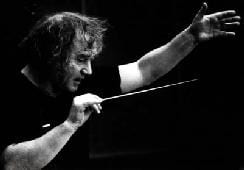 Jerzy Maksymiuk’s new composition …Jeno lotom nie wzbraniaj… was premiered by the Baltic Philharmonic on May 16, 2008 in Gdańsk. The composer conducted the concert, which also included Mozart’s Sinfonie Concertante Es-dur KV 364 for violin, viola and orchestra and Franck’s Symphony in D Minor. The concert featured Janusz Wawrowski on violin and Ryszard Grobelski on viola. For more information please visit the Baltic Philharmonic website.
Jerzy Maksymiuk’s new composition …Jeno lotom nie wzbraniaj… was premiered by the Baltic Philharmonic on May 16, 2008 in Gdańsk. The composer conducted the concert, which also included Mozart’s Sinfonie Concertante Es-dur KV 364 for violin, viola and orchestra and Franck’s Symphony in D Minor. The concert featured Janusz Wawrowski on violin and Ryszard Grobelski on viola. For more information please visit the Baltic Philharmonic website.
Honorary Doctorates
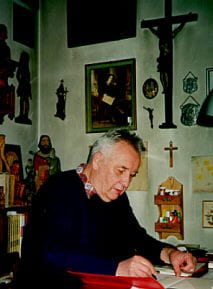
April 1998. Photo by Maja Trochimczyk.
Henryk Mikołaj Górecki, one of the most recognized amongst living Polish composers, has received an honoris causa doctorate from the Kraków Music Academy. This honor was recognized by the Kraków chapter of the Polish Composer’s Union during their 2008 Festival of Contemporary Music (see above), during a concert on May 12 in the Franciscan Basilica. Górecki was born in 1933 in Czernica, near Rybnik. He studied composition with Bolesław Szabelski at the Katowice State Music School, where later he served as faculty and dean. He is a laureate of numerous national and international awards, including several honorary doctorates from schools in Poland and abroad. His most famous work is his 3rd Symphony, which was a huge commercial success both amongst classical and popular audiences. The composer performed this work at the University of Southern California on October 3, 1997 during the Górecki Autumncelebration. (The composer is pictured above in Katowice, photo: M. Trochimczyk)
 Bernard Ładysz, an outstanding Polish singer, has received an honoris causa doctorate from the F. Chopin Music Academy in Warsaw. Ładysz was born in 1922 in Wilno; after WWII he moved to Warsaw and studied in State Music School with Wacław Filipowicz. An important point of his career was winning the first place prize in the International Voice Competition in Vercelli, Italy in 1956. Ładysz performed abroad until 1972, including engagements with Teatro Massino in Palermo and recording of Lucia di Lammermoor with Maria Callas. Since 1972, Ładysz has been a soloist with the Grand Theater-National Opera in Warsaw.
Bernard Ładysz, an outstanding Polish singer, has received an honoris causa doctorate from the F. Chopin Music Academy in Warsaw. Ładysz was born in 1922 in Wilno; after WWII he moved to Warsaw and studied in State Music School with Wacław Filipowicz. An important point of his career was winning the first place prize in the International Voice Competition in Vercelli, Italy in 1956. Ładysz performed abroad until 1972, including engagements with Teatro Massino in Palermo and recording of Lucia di Lammermoor with Maria Callas. Since 1972, Ładysz has been a soloist with the Grand Theater-National Opera in Warsaw.
Opus Award Nominations
 The first edition of the OPUS award, established by Polish Radio and Television [Polskie Radio i Telewizja Polska] to honor and promote outstanding contemporary music composition (see the May 08 Newsletter for details), will be given on June 27th during the gala in the Lutosławski Concert Studio of Polish Radio. The seven nominated composers are:
The first edition of the OPUS award, established by Polish Radio and Television [Polskie Radio i Telewizja Polska] to honor and promote outstanding contemporary music composition (see the May 08 Newsletter for details), will be given on June 27th during the gala in the Lutosławski Concert Studio of Polish Radio. The seven nominated composers are:
- Zbigniew Bargielski for Nocturne in Blue and Red
- Jerzy Kornowicz for Spiętrzenia
- Aleksander Lasoń for VII String Quartet
- Lidia Zielińska for Siedem Wysp Conrada [Seven Islands of Conrad]
- Paweł Mykietyn for II Symphony
- Aleksander Nowak for Last days of Wanda B.
- Ewa Trębacz for Thing lost, thing invisible
The winner of the prize will receive 200,000.00 PLN (ca. $90,000.00 USD) cash prize. The nominated composers were chosen by a jury chaired by experimental composer Włodzimierz Kotoński. For more information about the award and nominations please visit www.nagrody-mediow-publicznych.pl or www.polskieradio.pl/nagrody.
Polish Film & Music: L.A. Polish Film Festival
By Gary Fitelberg
Music sets the mood and tone for film. It is composers who create this mood and set the stage for the scenes, yet they often seem to be the most neglected of all in the world of film.
 During the screening of the 9th Polish Film Festival, which took place in Los Angeles from April 24th through May 4th, we were able to hear some of these talented composers. The Polish composers who were featured included Adam Walacinski (Death of a President), Wojciech Kilar (Dustclouds), Piotr Komorowski (Expecting Love), Michael Lorenc (Extras and Nothing), Ryszard Lenczewski (God’s Little Garden), Maciej Muraszko (Immensity of Justice), Zygmunt Konieczny (Jasminium), Krystof Penderecki (Katyń), Hadrian Filip Tabecki (Lejdis), Sebastian Krajewski (Preserve), Pawel Szymanski (Savior’s Square), Misza Hairulin (Testosterone and Tomorrow We’re Going to the Movies), and Wlodek Pawlik (Time to Die). These talented individuals, both known and unknown, lend special skills to create auditory and visual impressions which influence our sensory memories and perception. It is very interesting to note that two of these films utilized the music of famous classical composers – Wojciech Kilar and Krzysztof Penderecki.
During the screening of the 9th Polish Film Festival, which took place in Los Angeles from April 24th through May 4th, we were able to hear some of these talented composers. The Polish composers who were featured included Adam Walacinski (Death of a President), Wojciech Kilar (Dustclouds), Piotr Komorowski (Expecting Love), Michael Lorenc (Extras and Nothing), Ryszard Lenczewski (God’s Little Garden), Maciej Muraszko (Immensity of Justice), Zygmunt Konieczny (Jasminium), Krystof Penderecki (Katyń), Hadrian Filip Tabecki (Lejdis), Sebastian Krajewski (Preserve), Pawel Szymanski (Savior’s Square), Misza Hairulin (Testosterone and Tomorrow We’re Going to the Movies), and Wlodek Pawlik (Time to Die). These talented individuals, both known and unknown, lend special skills to create auditory and visual impressions which influence our sensory memories and perception. It is very interesting to note that two of these films utilized the music of famous classical composers – Wojciech Kilar and Krzysztof Penderecki.
There also were many movies with a musical highlight or theme featured during the film festival. Amongst the most important was Solo by Maciej Pisarek. This is a film about Bogusław Schaeffer, an expert filmmaker, composer and playwright. Since film as a form combines various media, it can, possibly better than a book, tell a story of a man who searches for the absolute in art. Versatile and full of ideas, Schaeffer is the Leonardo of the 20th century. He is both a conceptualist and an avant-garde artist whose art is captured in the process. Schaeffer creatively addresses the assumption that we are witnessing the decline of art as such.
Another major feature film, Immensity of Justice, features an interesting scene with some of the main characters, a prosecutor and later a judge, attending an opera with the opera star. The scene seems out of place for the film yet is memorable and powerful. Another film spotlighting music is a short film, Aria Diva, which features an opera diva named Basia (whose real voice is that of the famous contralto, Ewa Podleś) who is played powerfully by actress Katarzyna Figura. The film is about a housewife with a loving family who seems to be happy and not lacking anything in life until she meets a neighbor and stranger Basia. She seems enchanted and seduced by her voice. A very peculiar relationship emerges between the two women, both close and attractive yet uncomfortable and inexplicable.
One can transcend barriers and borders through the combination of the art of film and music, creating communication and dialogue between people from differing cultures and nationalities.
Łódź Phil Director Resigns
 The artistic director of the Artur Rubinstein Philharmonic in Łódź, Maestro Tadeusz Wojciechowski (pictured at right), has resigned from the post. In his explanation he said that “…the relationship between [him] and the orchestra became very tense and made it impossible to connect on a creative level with part of the ensemble…” The musicians insisted on a change of leadership after Mr. Wojciechowski announced that he would require the whole orchestra to re-audition. The orchestra refused and created a petition for the removal of Mr. Wojciechowski from his post. The petition was signed by 80% of the ensemble members and was supported by letters from musicians and officials from other Polish musical institutions.
The artistic director of the Artur Rubinstein Philharmonic in Łódź, Maestro Tadeusz Wojciechowski (pictured at right), has resigned from the post. In his explanation he said that “…the relationship between [him] and the orchestra became very tense and made it impossible to connect on a creative level with part of the ensemble…” The musicians insisted on a change of leadership after Mr. Wojciechowski announced that he would require the whole orchestra to re-audition. The orchestra refused and created a petition for the removal of Mr. Wojciechowski from his post. The petition was signed by 80% of the ensemble members and was supported by letters from musicians and officials from other Polish musical institutions.
Mozart Manuscripts At Jasna Góra
 Researchers have recently found 20 manuscripts signed with Mozart’s name in the music collections of Jasna Góra monastery in Częstochowa. Seven of the works are already known and published and four were determined to not be of Mozart’s authorship. The remaining nine are unknown and do not appear in any of the existing catalogs of Mozart’s compositions. It will require a considerable amount of research and examination to determine whether or not the manuscripts are written by Mozart. The experts of the Mozarteum in Salzburg will take a closer look at the music in the coming weeks. The manuscripts found in Jasna Góra are copies and, at the time when Mozart lived, it was common for the copyists to put false information on the music either by mistake or to create more interest in the music. If in fact these works are by Mozart, it will be an international sensation.
Researchers have recently found 20 manuscripts signed with Mozart’s name in the music collections of Jasna Góra monastery in Częstochowa. Seven of the works are already known and published and four were determined to not be of Mozart’s authorship. The remaining nine are unknown and do not appear in any of the existing catalogs of Mozart’s compositions. It will require a considerable amount of research and examination to determine whether or not the manuscripts are written by Mozart. The experts of the Mozarteum in Salzburg will take a closer look at the music in the coming weeks. The manuscripts found in Jasna Góra are copies and, at the time when Mozart lived, it was common for the copyists to put false information on the music either by mistake or to create more interest in the music. If in fact these works are by Mozart, it will be an international sensation.
Czech Chopin Competition
 The 7th bi-annual International Chopin Competition in Mariánské Lázně, Czech Republic, will be held from June 28 – July 2, 2008. The competition is intended for pianists of all nationalities up to 28 years old (born later than June 28, 1979). For candidates from the Czech Republic, this competition serves as a preliminary round of the International Chopin Piano Competition in Warsaw.
The 7th bi-annual International Chopin Competition in Mariánské Lázně, Czech Republic, will be held from June 28 – July 2, 2008. The competition is intended for pianists of all nationalities up to 28 years old (born later than June 28, 1979). For candidates from the Czech Republic, this competition serves as a preliminary round of the International Chopin Piano Competition in Warsaw.
Evaluation of the competition is fully open to the public and the complete results, including the points given by each of the jury members, will be announced in the Foyer of the Municipal Theatre. The concert of winners will take place on Wednesday, July 2nd, 2008 at 7pm in the Hall of the Municipal Theatre.
This competition will serve as a lead into the 49th Chopin Festival in Mariánské Lázně, August 16 – 23, 2008.
Spolecnost Fryderyka Chopina KaSS, or the Czech Fryderyk Chopin Society, was established in 1959 and it is the organizer of the Chopin Competition (bi-annual) and Festival (annual). The Society was originally based in the White Swan Inn, which was eventually renamed the Chopin House due to efforts of Society board members. The Fryderyk Chopin Memorial Museum was opened during the first year of the Society’s existence. Promotion of music and memory of the great romantic composer, as well as propagation of admiration and respect for Chopin’s immortal music amongst the young generation, is the Society’s goal. The Society is a member of the International Federation of Chopin Societies (IFCS).
2010 Year Of Chopin
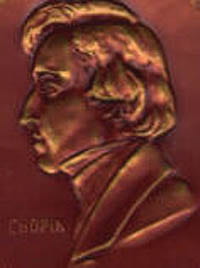 Polish Parliament [Sejm] unanimously passed a vote to make the year 2010 a year of Frederic Chopin. 2010 marks the 200th birthday of this extraordinary composer and pianist. The music of Frederic Chopin is to this day one of the most recognized Polish cultural assets and is performed around the world constantly. Members of Parliament expressed their excitement and support for the idea and some even pointed out that, until 1989, there was a grand piano in the Parliament building.
Polish Parliament [Sejm] unanimously passed a vote to make the year 2010 a year of Frederic Chopin. 2010 marks the 200th birthday of this extraordinary composer and pianist. The music of Frederic Chopin is to this day one of the most recognized Polish cultural assets and is performed around the world constantly. Members of Parliament expressed their excitement and support for the idea and some even pointed out that, until 1989, there was a grand piano in the Parliament building.
Awards
Young Polish Composers Lauded
 Young Polish composer and student at the Poznań Music Academy, Grzegorz Pieniek, was recently awarded for his submission to the 5th International Composition Competition “Concurso Internacional De Miniaturas Electroacústicas 2007” in Spain. Grzegorz Pieniek’s winning composition is Ruins of a factory for tape (2007), which along with the other laureate’s compositions will be released on a promotional CD.
Young Polish composer and student at the Poznań Music Academy, Grzegorz Pieniek, was recently awarded for his submission to the 5th International Composition Competition “Concurso Internacional De Miniaturas Electroacústicas 2007” in Spain. Grzegorz Pieniek’s winning composition is Ruins of a factory for tape (2007), which along with the other laureate’s compositions will be released on a promotional CD.
The competition attracted 349 compositions from 44 countries from around the world. The Grand Prize went to Dominique Thibault from Canada, who was chosen from the 13 finalists, including the Polish composer.
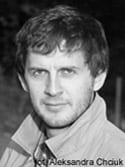 Another young Polish composer who recently received international acclaim is Marcin Stańczyk. He is the winner of the 3rd prize at the International Composition Contest “From Romantic to Contemporary,” organized by the National University of Music in Bukarest, Romania. The jury consisting of Cornel Taranu, Dan Dediu and Tadeusz Wielecki honored Stańczyk’s Dialogues de Douve (2006), a song cycle for voice and piano with text by Ives Bonnefoy. The concert featuring the awarded compositions took place on May 30, 2008 and was recorded for a promotional CD.
Another young Polish composer who recently received international acclaim is Marcin Stańczyk. He is the winner of the 3rd prize at the International Composition Contest “From Romantic to Contemporary,” organized by the National University of Music in Bukarest, Romania. The jury consisting of Cornel Taranu, Dan Dediu and Tadeusz Wielecki honored Stańczyk’s Dialogues de Douve (2006), a song cycle for voice and piano with text by Ives Bonnefoy. The concert featuring the awarded compositions took place on May 30, 2008 and was recorded for a promotional CD.
Marcin Stańczyk is a graduate of Łódź Music Academy, where he studied with Zygmunt Krauze and Krzysztof Knittel. Currently he studies composition as part of the Corso di Perfezionamento Musicale (2008-2010) in Accademia Nazionale di Santa Cecilia in Rome, with Ivan Fedele.
Kiepura Theater Music Awards
The gala of the second edition of the Jan Kiepura Theater Music Awards took place in Sosnowiec on May 16, 2008. The recipients were chosen by a committee consisting of Prof. Zdzisława Donat, Dr. Zofia Rudnicka, Maestro Wiesław Ochman, Prof. Tadeusz Strugała and chairman Włodzimierz Izban. Musical theatres from all over Poland are able to send candidacies for the award. The special award for lifetime achievement is given to an artist selected by the committee. This year’s nominees were: Teresa Żylis-Gara, Wanda Polańska, Witold Gruca, Wiesław Ochman and Bernard Ładysz. The following awards were given:
 Best new production – ballet Pan Twardowski by Ludomir Różycki (Opera Nova in Bydgoszcz)
Best new production – ballet Pan Twardowski by Ludomir Różycki (Opera Nova in Bydgoszcz)- Best female singer – Dorota Laskowiecka, soprano (Mazovian Jan Kiepura Music Theater “Operetka” in Warsaw)
- Best male singer – Arnold Rutkowski, tenor (Wrocław Opera)
- Best stage director – Wojciech Kościelniak, (Danuta Baduszkowa Music Theater in Gdynia)
- Best dancer (male or female) – Olga Marczak (Opera Nova in Bydgoszcz)
- Best conductor – Dariusz Różankiewicz (Danuta Baduszkowa Music Theater in Gdynia)
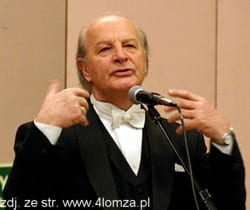 Special award for lifetime achievement – Wiesław Ochman(pictured at right)
Special award for lifetime achievement – Wiesław Ochman(pictured at right)- Best debut (male or female singer) – Barbara Gutaj(Mazovian Jan Kiepura Music Theater “Operetka” in Warsaw)
Paweł Mykietyn Honored
Polish composer Paweł Mykietyn has received the “Gwarancja Kultury” Award, which was established three years ago by the Cultural broadcast station of Polish TV, TVP Kultura. The award is given in several categories including Literature, Theater, Cinematography, Classical Music, “Jazz, Rock and other,” Alternative Culture and Visual Arts, Achievement in Creative Development of Children and Youth, and Best Artistic Event of the Year. Visit www.tvp.pl for more details.
Obie Award For Warlikowski
 The 53rd annual Obie Awards of the Village Voice newspaper were presented on Monday, May 19, 2008 during a ceremony at Webster Hall in New York. Polish opera and theater director Krzysztof Warlikowskiwas honored for his production of Hanoch Levin’s Krum at the BAM 2007 Next Wave Festivalin New York, which was co-presented by the Polish Cultural Institute in New York. As Mr. Warlikowski was in the middle of dress rehearsals for the revival of his 2006 production of Gluck’s Iphigénie en Tauride at the Paris National Opera during the time of the ceremony, the award was accepted by Monika Fabijanska, Director of the Polish Cultural Institute. Krzysztof Warlikowski sent a special letter to the OBIE jury and New York audience, which was read by Ms. Fabijanska at the ceremony.
The 53rd annual Obie Awards of the Village Voice newspaper were presented on Monday, May 19, 2008 during a ceremony at Webster Hall in New York. Polish opera and theater director Krzysztof Warlikowskiwas honored for his production of Hanoch Levin’s Krum at the BAM 2007 Next Wave Festivalin New York, which was co-presented by the Polish Cultural Institute in New York. As Mr. Warlikowski was in the middle of dress rehearsals for the revival of his 2006 production of Gluck’s Iphigénie en Tauride at the Paris National Opera during the time of the ceremony, the award was accepted by Monika Fabijanska, Director of the Polish Cultural Institute. Krzysztof Warlikowski sent a special letter to the OBIE jury and New York audience, which was read by Ms. Fabijanska at the ceremony.
Previous Polish winners of the Obie Awards are: Tadeusz Kantor for his production of The Dead Class at La MaMa E.T.C. (1980) and Elzbieta Czyzewska for her role in Crowbar by Mac Wellman, a site-specific project by Anne Hamburger’s En Garde Arts company (1990).
Polish Singer Honored In Brussels
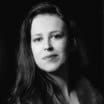 Polish mezzo-soprano Bernadetta Grabias took 3rd place, winning the Count de Launoit Prize, in the vocal edition of the prestigious Queen Elizabeth International Music Competition of Belgium – Brussels. Bernadetta Grabias graduated from Łódź Music Academy with honors and currently is a soloist of the Grand Theatre in Łódź.
Polish mezzo-soprano Bernadetta Grabias took 3rd place, winning the Count de Launoit Prize, in the vocal edition of the prestigious Queen Elizabeth International Music Competition of Belgium – Brussels. Bernadetta Grabias graduated from Łódź Music Academy with honors and currently is a soloist of the Grand Theatre in Łódź.
The first prize, Queen Elizabeth International Grand Prize and Queen Fabiola Prize, went to Hungarian tenor, Szabolcs Brickner. Second prize, prize of the Federal Belgian Government, was awarded to French mezzo-soprano, Isabelle Druet.
The Queen Elizabeth International Music Competition of Belgium – Brussels was established in 1937 with great involvement of Queen Elizabeth (widow of King Albert I), great lover and supporter of arts. There are three editions of the competition, which rotate annually: piano, violin and vocal editions, as well as a composition competition before each instrumental edition.
For a complete list of laureates and more information about the competition please visit www.cmireb.be.
Polish Choir Honored
The Polish choir “Amicus” has received the 3rd Prize at the 10th International Competition-Festival of Children and Youth Singing “Spring Bells.” The choir from Krasnystaw is directed by Ewa Zarzycka. Best accompanist award went to Mariusz Dubaj. The competition attracted 11 choirs from Poland, Russia, Estonia and Ukraine.
Festivals
Internat’l Sacred Music Festival
The 18th edition of the International Sacred Music Festival will take place between June 1-8, 2008 in Warsaw. The idea of the festival is to present Polish and international musical works related to Catholicism and other religions. The festival is one of the more important musical events in Warsaw. Cardinal Józef Glemp is the official patron of the festival and during the festivities he will award a “Silver Pipe Reed” for special achievements in the development of sacred music in Poland. The festival is organized by the Sacred Music Festival Foundation. For the detailed program, visit: www.kapitula.org/mfmskal.html.
Mozart Festival
 The 18th edition of the Mozart Festival in Warsaw will start on June 15, 2008 and will last until July 26. The festival is organized by the Warsaw Chamber Opera and is focused on presenting not only opera repertoire of the great master but also his chamber, concert and vocal-instrumental works as well. The concerts will take place on stage of the Warsaw Chamber Opera, the Royal Castle, Łazienki Park, and several churches around Warsaw. For a complete program and festival information, please visit www.operakameralna.pl.
The 18th edition of the Mozart Festival in Warsaw will start on June 15, 2008 and will last until July 26. The festival is organized by the Warsaw Chamber Opera and is focused on presenting not only opera repertoire of the great master but also his chamber, concert and vocal-instrumental works as well. The concerts will take place on stage of the Warsaw Chamber Opera, the Royal Castle, Łazienki Park, and several churches around Warsaw. For a complete program and festival information, please visit www.operakameralna.pl.
Polish Fest
 Polish Fest is one of the largest and most popular of the festivals that happen almost every weekend in Milwaukee, WI during the summer. It is a festival celebrating all things Polish, including food, music, dance, arts, culture, geography/geneology, etc. For many years, Polish Fest has included a Chopin Youth Competition for aspiring young classical musicicans.
Polish Fest is one of the largest and most popular of the festivals that happen almost every weekend in Milwaukee, WI during the summer. It is a festival celebrating all things Polish, including food, music, dance, arts, culture, geography/geneology, etc. For many years, Polish Fest has included a Chopin Youth Competition for aspiring young classical musicicans.
The festival will take place from June 20-22. Some of this year’s musical highlights include: Kraków Polish Dancers (Milwaukee, WI), Lidia Kaminska – classical accordionist, Syrena & Syrenka Polish Folk Dance Ensemble (Milwaukee, WI), Stas Venglevski – virtuoso accordionist, Wawel Polish Dancers (Detroit, MI), Grażyna Auguścik – jazz singer, Wesoły Lud Polish Dancers (Chicago, IL), and the Marcin Januszkiewicz Jazz Quintet.
For more information, please visit www.polishfest.org.
Discography
Stojowski On DUX: A Review
by Krysta Close
 Zygmunt Stojowski
Zygmunt Stojowski
Zygmunt Stojowski: Suite in E flat Major for symphonic orchestra Op. 9; Le Printemps – cantata for mixed choir and orchestra Op. 7; Prayer for Poland – cantata for soprano, baritone, mixed choir, orchestra and organ Op. 40
Podlasie Philharmonic Orchestra and Choir in Białystok, Marcin Nałęcz-Niesiołowski – conductor, Marta Wróblewska – soprano, Maciej Nerkowski – baritone, Rafał Sulima – organ
DUX 0625
The Podlasie Philharmonic Orchestra and Choir in Białystok have achieved a noteworthy accomplishment with their new recording of music by Zygmunt Stojowski (DUX 0625). The CD includes three impressive compositions: Suite for Orchestra in E-flat major, Op. 9; Le Printemps, Op. 7 – cantata for mixed choir and orchestra; and Prayer for Poland, Op. 40 – cantata for soprano, baritone, mixed choir, orchestra, and organ. Conductor Marcin Nałęcz-Niesiołowski should be commended for the musicality that he inspires in the Podlasie Philharmonic – as Stojowski scholar Joseph A. Herter says about the performance, “the orchestra has a wonderful sound and the strings a lovely cantabiletone.” Both orchestra and conductor, as well as choir and soloists, go to great lengths to preserve the beauty and drama of Stojowski’s music.
 In the Polish Music Center’s “Zygmunt & Luisa Stojowski Collection,” there is an archival recording of the Suite for Orchestra as recorded in 1939 by Antonia Brico and the Brico Symphony Orchestra at Carnegie Hall. Antonia Brico (pictured at right) was a student of Stojowski’s for two years, during which time she also lived with his family, and was a pioneering woman in the field of conducting. In comparing these two recordings, Mr. Herter comments that “although the Brico Orchestra cannot match the beauty of sound of the Białystok Orchestra, her tempos are on the brighter side, making for a much more exciting first movement.” Although the first movement may take a bit to get off the ground rhythmically, the orchestra has clearly hit its stride by the second and third movements and carries the listener through varied and exciting musical adventure.
In the Polish Music Center’s “Zygmunt & Luisa Stojowski Collection,” there is an archival recording of the Suite for Orchestra as recorded in 1939 by Antonia Brico and the Brico Symphony Orchestra at Carnegie Hall. Antonia Brico (pictured at right) was a student of Stojowski’s for two years, during which time she also lived with his family, and was a pioneering woman in the field of conducting. In comparing these two recordings, Mr. Herter comments that “although the Brico Orchestra cannot match the beauty of sound of the Białystok Orchestra, her tempos are on the brighter side, making for a much more exciting first movement.” Although the first movement may take a bit to get off the ground rhythmically, the orchestra has clearly hit its stride by the second and third movements and carries the listener through varied and exciting musical adventure.
A light-hearted and almost folky composition, Le Printemps is a joyful experience. While the diction is not always clear, the choir soars through the repeated octave leaps with bravado and clarity. Choir and orchestra move together as one throughout the cantata, delicately painting a melodic soundscape.
Mr. Herter’s commentary on the performance of the final piece sums it up: “Prayer for Poland is quite wonderful.” Both soloists – Marta Wróblewska, soprano and Maciej Bogumił Nerkowski, baritone – give beautiful performances, and contribute greatly to the dramatic content and textual interpretation of the performance. The orchestra is supremely expressive, lending a wide range of rhythmic and dynamic color. The only thing lacking in this performance is proper pipe organ; despite excellent playing by organist Rafał Sulima, the electronic organ does not quite provide the full, rich sound for which Stojowski’s music calls. Although all of these compositions were written on foreign soil, the Polish flavor is still evident in all of them, most directly in the patriotic fervor of the Prayer for Poland.
This historic recording by the Podlasie Philharmonic Orchestra and Choir in Białystok featuring an enticing selection of Zygmunt Stojowski’s oeuvre has made a great contribution to his legacy. Their excellent presentation will surely bolster to the effort to return Stojowski’s music to the concert repertoire.
[Historical details for this review were taken from Joseph A. Herter’s Zygmunt Stojowski: Life and Music (PMHS Vol. 10) – published by the Polish Music Center and Figueroa Press, 2007. More details are also provided in Mr. Herter’s “Liner Notes” for this recording. Commentary by Mr. Herter for this review was given via email, on May 12 and May 29, 2008.]
More New DUX
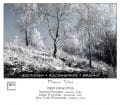 Beethoven, Rachmaninov, Brahms – Piano Trios
Beethoven, Rachmaninov, Brahms – Piano Trios
Ludwig van Beethoven: Piano Trio Op. 1, no. 3 in C Minor; Sergey Rachmaninov: Piano Trio in G Minor “Élégiaque”; Johannes Brahms: Piano Trio Op. 101 C minor
Trio Cracovia: Krzysztof Śmietana – violin, Jerzy Tosik-Warszawiak – piano, Julian Tryczyński – cello
DUX0626
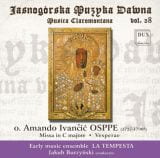 Jasnogórska Muzyka Dawna. Musica Claromontana vol. 28
Jasnogórska Muzyka Dawna. Musica Claromontana vol. 28
Father Amando Ivančić Osppe: Missa in C Majore, Vesperae
“La Tempesta” Early Music Ensemble, Jakub Burzyński, conductor
DUX0358
 Jasnogórska Muzyka Dawna. Musica Claromontana vol. 29
Jasnogórska Muzyka Dawna. Musica Claromontana vol. 29
Father Amando Ivančić Osppe: Missa in C (Wawel Manuscript), Divertimento ex G, Divertimento ex B, Lytaniae ex C
“La Tempesta” Early Music Ensemble, Jakub Burzyński, conductor
DUX0355
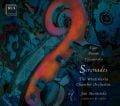 Dvořák, Elgar, Tchaikovsky – Serenades
Dvořák, Elgar, Tchaikovsky – Serenades
Antonín Dvorák: Serenade Op. 22 in E Major; Edward Elgar: Serenade Op. 20 in E Minor; Peter Ilyich Tchaokovsky: Serenade Op. 48 in C Major
Wratislavia Chamber Orchestra, Jan Stanienda – violin, conductor
DUX0278
 Returning Sounds
Returning Sounds
Anna Ignatowicz-Glińska: Passacaglia; Rolf Wallin: Twine; Miłosz Bembinow: Returning Sounds for Magda & Miłosz; Jacob ter Veldhuis: Goldrush; Marcin Błażewicz: Sahaj Manush
HOB-BEATS Percussion Duo: Magda Kordylasińska, Miłosz Pękala
DUX0627
New From Polish Radio
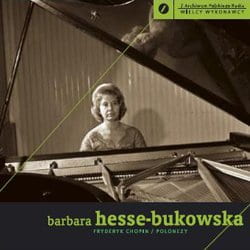 Chopin Selected Polonaises
Chopin Selected Polonaises
Frederic Chopin: Polonaises Op. 26, 40, 61 & posth.
Barbara Hesse-Bukowska, piano
PRCD1017
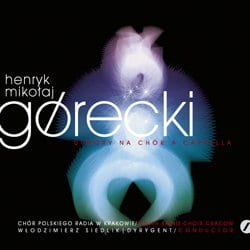 Henryk Mikołaj Górecki – Works for Choir a capella
Henryk Mikołaj Górecki – Works for Choir a capella
Henryk Mikołaj Górecki: Wisło moja Op. 46, Szeroka woda Op. 39, Hej z góry, z góry! kóniku bury – 5 Kurpian songs Op. 75, Przybądź Duchu Święty Op. 61, Totus Tuus Op. 60, Zdrowaś bądź Maryja – Pieśni Maryjne Op. 54, Pieśń rodzin Katyńskich Op. 81, Amen Op. 35
Polish Radio Choir in Kraków, Włodzimierz Siedlik, conductor
PRCD1104-05
Brana Presents Blumental
 Polish Fantasy: Penderecki & Paderewski
Polish Fantasy: Penderecki & Paderewski
Ignacy Jan Paderewski – Piano Concerto in A minor; Krzysztof Penderecki – Partita for Harpsichord; and Paderewski – Fantaisie Polonaise for Piano and Orchestra
Felicja Blumental, piano, with: the Vienna Symphony Orchestra, Helmut Froschauer – Conductor; the Polish Radio Symphony Orchestra, Krzysztof Penderecki – Conductor; and the Innsbruck Symphony Orchestra, Robert Wagner – Conductor
Brana Records BR0028
With this disc, Felicja Blumental does great service to her Polish compatriots, as she resurrects a piano concerto/patriotic fantasy by Paderewski and assumes the central role on harpsichord for Penderecki’s Partita, dedicated to her by the composer. For a concertantework of the period, Paderewski’s Piano Concerto in A minor Op.17 leans toward a bucolic simplicity, harking back to the piano concertos of Chopin and Grieg in terms of influence. Polish rhythms abound, most notably the mazurka while much of the melodic material is imbued with the Polish folk song tradition. The Fantaisie Polonaise, Op.19 is a lively, folksy and, above all, avowedly virtuoso showpiece packed full of Polish dances from the krakowiak to the kujawiak.
Penderecki’s Partita for Harpsichord was commissioned for the 50th anniversary of the Eastman School of Music in Rochester, New York, and was premiered there in 1971by its dedicatee, Felicja Blumental. The instrumentation of the Partita alone gives us fair warning that we’re in for an eclectic surprise. The scoring (which came as a surprise to Ms Blumental) is for harpsichord, electric guitar, bass guitar, double bass and orchestra, all of which reads like a cross between the concertino grouping of a Baroque concerto grossoand the line-up for a jazz outfit.
 The Spirit of Poland
The Spirit of Poland
Karol Szymanowski – Symphony No. 4 “Symphonie Concertante” for piano and orchestra, Op. 60, M70, and Variations for Piano in B flat minor, Op. 3, M5; Fryderyck Chopin – Piano Concerto in F minor, Op. 21
Felicja Blumental, piano, with: the Polish Radio Symphony Orchestra of Katowice, Kazimierz Kord – Conductor; and the Innsbruck Symphony Orchestra, Robert Wagner – Conductor
Brana Records BR0030
Pianist Felicja Blumental explores the vibrant repertoire of Karol Szymanowski (who taught the young Blumental composition) and fellow Pole Fryderyk Chopin, whose music was a fundamental part of Felicja Blumental’s recording career which brought her great acclaim. That the music of Chopin also played a fundamental part in the recording studio and concert platform for Felicja Blumental should barely come as a surprise. As a fellow Pole, and a student at the National Conservatory, she was steeped in the music of her native land through her piano teachers Zbigniew Drzewiecki, Joseph Goldberg and Stefan Askenase, later bolstering these studies with the noted Chopin expert Józef Turczynski.
Performances
Zimerman In London
 On Tuesday, May 27th, Polish pianist Krystian Zimerman (pictured at right) performed in London’s Royal Festival Hall. His challenging program consisted of Bach’s Partita No 4 in D for keyboard, BWV828; Beethoven’s Piano Sonata in C minor, Op 111; Four Pieces for piano, Op 119, by Brahms; and Szymanowski’s Variations on a Polish folk theme in B minor, Op 10.
On Tuesday, May 27th, Polish pianist Krystian Zimerman (pictured at right) performed in London’s Royal Festival Hall. His challenging program consisted of Bach’s Partita No 4 in D for keyboard, BWV828; Beethoven’s Piano Sonata in C minor, Op 111; Four Pieces for piano, Op 119, by Brahms; and Szymanowski’s Variations on a Polish folk theme in B minor, Op 10.
Dward Seckerson of The Independent gave the performance 3 stars out of 5 in his review from May 29th, 2008. He gives the following explanation for his lack of excitement regarding the performance:
Krystian Zimerman had his piano’s mechanism changed after the Bach Partita. Colour is important to every pianist but especially Zimerman, and from Bach to Beethoven should have marked the first seismic shift of the evening. That it didn’t was an indication that this was to be an evening where virtuosity and sonic sensitivity took precedence over spiritual fulfilment… [In the Szymanowski] was all the evidence you needed that Zimerman is a master colourist – the range of chord weightings alone seemed inexhaustible, not least in the Chopinesque funeral march variation. But I’d have sacrificed all this virtuosity for just one unexpected bar of Beethoven.
Augustyn At De Lamar Mansion
 On March 20th, the Consulate General of the Republic of Poland in New York presented a concert featuring the Violin and Piano Duo of Kinga Augustyn and Kevin Kwan Loucks, as a part of the De Lamar Mansion Salon of Arts & Ideas series. Ms. Augustyn is a Polish violinist currently pursuing her Masters degree at the Juilliard School of Music, where she is working with Cho Liang Lin and Naoko Tanaka. Mr. Loucks is a recent graduate of The Juilliard School, where he earned his Master of Music degree as a student of Julian Martin, and he is currently a candidate of the Doctor of Musical Arts degree at SUNY Stony Brook, where he is working with Christina Dahl.
On March 20th, the Consulate General of the Republic of Poland in New York presented a concert featuring the Violin and Piano Duo of Kinga Augustyn and Kevin Kwan Loucks, as a part of the De Lamar Mansion Salon of Arts & Ideas series. Ms. Augustyn is a Polish violinist currently pursuing her Masters degree at the Juilliard School of Music, where she is working with Cho Liang Lin and Naoko Tanaka. Mr. Loucks is a recent graduate of The Juilliard School, where he earned his Master of Music degree as a student of Julian Martin, and he is currently a candidate of the Doctor of Musical Arts degree at SUNY Stony Brook, where he is working with Christina Dahl.
 The program consisted of: J.S. Bach – Partita no. 2 for solo violin; L. van Beethoven – Sonata no. 10, op. 96; P. Sarasate – Zigeunerweise; and W. Lutosławski – Subito. This event at the De Lamar Mansion—the residence of the Consulate General of Poland—was free and open to the public.
The program consisted of: J.S. Bach – Partita no. 2 for solo violin; L. van Beethoven – Sonata no. 10, op. 96; P. Sarasate – Zigeunerweise; and W. Lutosławski – Subito. This event at the De Lamar Mansion—the residence of the Consulate General of Poland—was free and open to the public.
The De Lamar Mansion Salon of Arts & Ideas was inaugurated in October 2006 with the centennial celebrations of this Beaux-Arts period masterpiece of residential architecture in Manhattan. The series has hosted such famous artists as: David Lynch, Malgorzata Walewska, Tomasz Stanko, Zbigniew Rybczynski, and Jan A.P. Kaczmarek.
Anniversaries
Born This Month
- June 1, 1909 – Maria DZIEWULSKA, composer and theoretician (d. 2006)
- June 4, 1845 – Aleksander POLIŃSKI, music historian (d. 1916)
- June 4, 1784 – Adam CZARNOCKI, music ethnographer (d. 1825)
- June 5, 1865 – Felicjan SZOPSKI, composer and music critic (d. 1939)
- June 6, 1929 – Bogusław SCHAEFFER, composer, writer
- June 12, 1897 – Aleksander TANSMAN, composer and pianist,
- June 16, 1923 – Henryk CZYŻ, conductor and composer
- June 17, 1930 – Romuald TWARDOWSKI, composer
- June 28, 1895 – Kazimierz SIKORSKI, composer and teacher
- June 28, 1904 – Włodzimierz POŹNIAK, musicologist
Died This Month
- June 1, 1869 – Jozef DULEBA, pianist and participant of January Uprising, died in a duel (b. 1843)
- June 3, 1904 – Daniel FILLEBORN, singer and performer of main parts in Moniuszko’s operas (b. 1841)
- June 4, 1872 – Stanislaw MONIUSZKO, Father of Polish National opera (b. 5 May 1819)
- June 5, 1964 – Henryk SZTOMPKA, pianist, Chopin specialist, teacher
- June 9, 1932 – Natalia JANOTHA, pianist and composer, student of Clara Wieck-Schumann, Royal Pianist in London, 400 opus numbers (b. 1856)
- June 10, 1953 – Grzegorz FITELBERG, conductor, composer, great promoter of new music, esp. Szymanowski (b. 1879)
- June 28, 1938 – Ludwik DRZEWIECKI, pianist and father of Zbigniew Drzewiecki
- June 29, 1945 – Kazimierz GARBUSINSKI, pianist, organist, composer
- June 30, 1957 – Michal SWIERZYNSKI, composer and choral conductor
